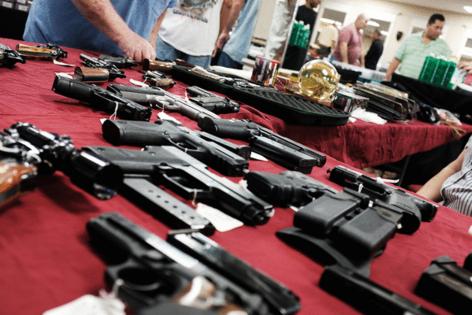5 things to know about the Maryland board that approves guns for sale
Published in News & Features
BALTIMORE — Reported crime is on the decline in Baltimore, with homicides down 22% compared to this time last year and nearly 20% in nonfatal shootings — but across the state, more guns than ever are available for sale.
The state’s volunteer board keeps adding more and more guns to the list of what Marylanders can buy and sell legally within the state’s borders, about a hundred at a time.
1. What is the Handgun Roster Board?
The Maryland Handgun Roster Board determines whether a handgun meets the state’s requirements for sale. Petitioners must file requests with the board to sell or purchase a new handgun or updated model within Maryland.
Members, who are appointed by the governor to four-year terms, must weigh nine factors when considering a handgun, including detectability by a metal detector, usage for sport activity or protection, accuracy, weight, quality of materials and manufacturing, “reliability as to safety,” caliber and concealability.
If approved, a gun is added to the state’s “roster,” a list of guns that can legally be bought or sold within Maryland.
Members vote on dozens of handguns per meeting — often more than 100 — for inclusion on the state roster at each meeting. They meet between four and six times a year.
The Maryland State Police test new handguns put before the board, though new models of the same gun are not subject to similar tests. The police usually present an oral and written report covering the gun size, weight, performance during firing tests, and more.
2. A ‘rubber stamp’
The Baltimore Sun data analysis showed that since 2018, the Maryland Handgun Roster board has approved thousands of petitions, allowing new handguns or handgun models to be sold in the state as long as they function. Between 2018 and 2024, unless a gun did not fire — or a petitioner incorrectly filed their petition — the board passed it through, in what critics called a “rubber stamp,” approving 95% of handguns put before them during those seven years.
That meant the board added nearly 2,500 new handgun models to the state’s roster.
3. No way to remove defective guns from the roster
During that time, the board approved multiple versions of the SIG P320, a 9mm handgun that has been the subject of dozens of lawsuits that allege the gun fires without a trigger pull.
A 2023 investigation by The Trace found more than 80 people who said the pistol had wounded them — and that they never touched the trigger.
The New Hampshire-based gunmaker denies the claims, saying the pistol is safe and the problem is user error. It has prevailed in some cases.
Board members told The Sun that no one provided them with information about the lawsuits before the gun came before the board in March. Additionally, there is no way for the board to reconsider a handgun that is on the approved list, even if problems are discovered later.
4. Is it a handgun or a short-barreled rifle? In Maryland, it’s both
Over the past several years, more and more residents have come before the Maryland Handgun Roster Board asking them to approve short-barreled rifles, guns that can measure two feet in length.
While Maryland defines short-barreled rifles as handguns, the Bureau of Alcohol, Tobacco and Firearms says handguns or pistols are “originally designed, made, and intended to fire a projectile (bullet) from one or more barrels when held in one hand.”
Baltimore City State’s Attorney Ivan Bates, one of the board members appointed by Gov. Wes Moore, a Democrat, spoke out at last week’s board meeting. Bates voted ‘no’ on what he considered short-barreled rifles and called for the legislature to reconsider and rewrite the state’s definition of handguns to exclude these “more forceful,” damaging weapons.
“We have to make sure we acknowledge the seriousness of these weapons,” Bates told The Sun.
Board member Michael Errico, who was appointed by Gov. Bob Ehrlich, a Republican, agreed with Bates when The Sun interviewed him in September.
“Those weapons only started coming to the board in great numbers recently,” Errico told The Sun. “Maryland’s definition needs to be consistent with the federal definition.”
5. ‘Ban the object’
Second Amendment advocates argue that the gun board’s recent history of denying short-barreled rifles to petitioners is illegal and an assault on the U.S. Constitution, as state law expressly allows the purchase of these guns as handguns.
“Instead of banning the criminals, they want to ban the object thinking, well, this will deter them,” John Josselyn, president and founder of 2A Maryland, an advocacy group for gun rights, told The Sun.
But, he said, it won’t.
Josselyn said he believed access to housing, employment opportunities and education, focusing on moral integrity, were a better path forward and would lead to decreased crime while preserving Marylanders’ access to guns.
--------------
©2025 The Baltimore Sun. Visit at baltimoresun.com. Distributed by Tribune Content Agency, LLC.







Comments